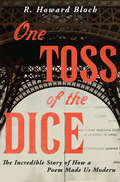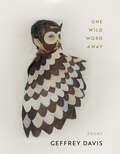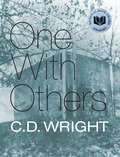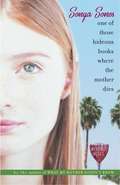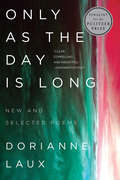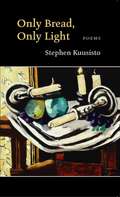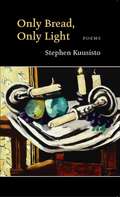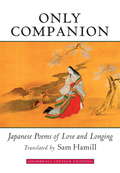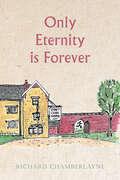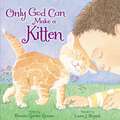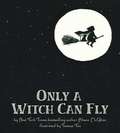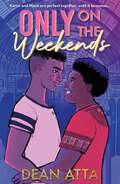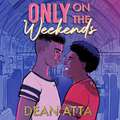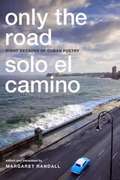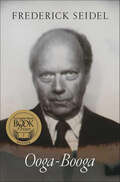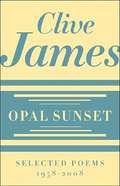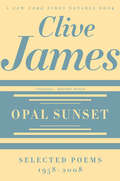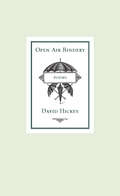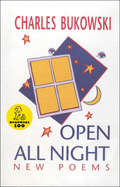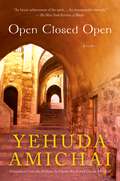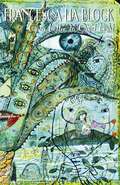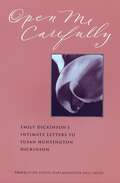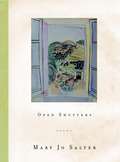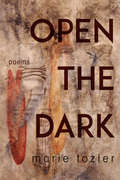- Table View
- List View
One Toss of the Dice: The Incredible Story of How a Poem Made Us Modern
by R. Howard BlochIn the tradition of The Swerve comes this thrilling, detective-like work of literary history that reveals how a poem created the world we live in today. It was, improbably, the forerunner of our digital age: a French poem about a shipwreck published in 1897 that, with its mind-bending possibilities of being read up and down, backward and forward, even sideways, launched modernism. Stéphane Mallarmé’s "One Toss of the Dice," a daring, twenty-page epic of ruin and recovery, provided an epochal “tipping point,” defining the spirit of the age and anticipating radical thinkers of the twentieth century, from Albert Einstein to T. S. Eliot. Celebrating its intrinsic influence on our culture, renowned scholar R. Howard Bloch masterfully decodes the poem still considered among the most enigmatic ever written. In Bloch’s shimmering portrait of Belle Époque Paris, Mallarmé stands as the spiritual giant of the era, gathering around him every Tuesday a luminous cast of characters including Émile Zola, Victor Hugo, Claude Monet, André Gide, Claude Debussy, Oscar Wilde, and even the future French prime minister Georges Clemenceau. A simple schoolteacher whose salons and prodigious literary talent won him the adoration of Paris’s elite, Mallarmé achieved the reputation of France’s greatest living poet. He was so beloved that mourners crowded along the Seine for his funeral in 1898, many refusing to depart until late into the night, leaving Auguste Renoir to ponder, “How long will it take for nature to make another such a mind?” Over a century later, the allure of Mallarmé’s linguistic feat continues to ignite the imaginations of the world’s greatest thinkers. Featuring a new, authoritative translation of the French poem by J. D. McClatchy, One Toss of the Dice reveals how a literary masterpiece launched the modernist movement, contributed to the rise of pop art, influenced modern Web design, and shaped the perceptual world we now inhabit. And as Alex Ross remarks in The New Yorker, "If you can crack [Mallarmé’s] poems, it seems, you can crack the riddles of existence." In One Toss of the Dice, Bloch finally, and brilliantly, dissects one of literary history’s greatest mysteries to reveal how a poem made us modern.
One Wild Word Away
by Geffrey DavisWhen tensions veer between hope and despair, the ensuing fracture can swing like a scythe and cut a ragged seam between past and present. In One Wild Word Away, Geffrey Davis weaves a deft set of poems about illness, family, loss, and rebirth. The luxurious sonics and crisp descriptions in each line are haunted by grief and buoyed by love as the speaker confronts generational trauma and the loss of a loved one while in the process of raising his own son.
One With Others
by C. D. WrightHonored in "Best Books of the Year" listings from The New Yorker, National Public Radio, Library Journal, and The Huffington Post."One With Others represents Wright's most audacious experiment yet."-The New Yorker"[A] book . . . that defies description and discovers a powerful mode of its own."- National Public Radio"[A] searing dissection of hate crimes and their malignant legacy."-BooklistToday, Gentle Reader,the sermon once again: "SegregationAfter Death." Showers in the a.m.The threat they say is moving from the east.The sheriff's club says Not now. Notnokindofhow. Not never. The children'sminds say Never waver. Airfanned by a flock of hands in the oldfuneral home where the meetingswere called [because Mrs. Oliverowned it free and clear], andthat selfsame air, sanctifiedand doomed, rent with racism, andit percolates up from the soil itself . . . In this National Book Award finalist and National Book Critics Circle Award finalist, C.D. Wright returns to her native Arkansas and examines explosive incidents grounded in the Civil Rights Movement. In her signature style, Wright interweaves oral histories, hymns, lists, interviews, newspaper accounts, and personal memories-especially those of her incandescent mentor, Mrs. Vittitow-with the voices of witnesses, neighbors, police, and activists. This history leaps howling off the page.C.D. Wright has published over a dozen works of poetry and prose. Among her honors are the Griffin Poetry Prize and a MacArthur Fellowship. She teaches at Brown University and lives outside of Providence, Rhode Island.
One Word to the Other
by Octavio PazLike Pequeña crónica de grandes días, One Word To The Other is also "a short chronicle," not of "grandes dias," not of "experiences," but of a life of reading and of "the search for others." Two persons with the name Octavio Paz are presented here. One is the poet, who exists only as "a fiction, a figure of speech." The other person is the "real person," "the first reader," the one who carefully edits and gives the poem its final form.
One of Those Hideous Books Where The Mother Dies
by Sonya Sones Ann SullivanWhen Ruby’s mother dies, she’s dragged three thousand miles away from her gorgeous boyfriend, Ray, to live in LA with her father, who she’s only ever seen in movies. He’s a mega-famous actor who divorced her mom before Ruby was even born, and while the rest of the world may love him, Ruby definitely does not. But as time passes and pages turn, Ruby comes to understand that circumstances are far more complicated than they seem, and sometimes forgiveness is found where you least expect it. This award-winning and bestselling novel in verse weaves a gripping narrative that is accessible as it is compelling.
Only As the Day Is Long: New And Selected Poems
by Dorianne LauxFinalist for the 2020 Pulitzer Prize in Poetry “Clear, compelling and insightful.” —Washington Post Earthy and lyrical, Only as the Day Is Long draws from Dorianne Laux’s five expansive, award-winning volumes and includes twenty new odes that pay homage to the poet’s mother. Exploring experiences of survival and healing, of sexual love and celebration, Only as the Day Is Long represents a bold and brilliant body of work from a “poet of immense insight and masterful craft” (Kwame Dawes).
Only Bread, Only Light
by Stephen KuusistoWith this, his first collection of poetry, Stephen Kuusisto (author of the memoir Planet of the Blind) explores blindness and curiosity, loneliness and the found instruments of continuation. Exploiting the seeming contradiction of poetry's reliance upon visual imagery with Kuusisto's own sightlessness, these poems cultivate a world of listening: to the natural world, to the voices of family and strangers, to music and the words of great writers and thinkers.Kuusisto has written elsewhere, "I see like a person who looks through a kaleidoscope; my impressions of the world at once beautiful and largely useless." So it is no surprise that in his poems mortal vision is uncertain, supported only by the ardor of imagination and the grace of lyric surprise. Sensually rich and detailed, Kuusisto's poems are humorous, complex, and intellectually engaged. This collection reveals a major new poetic talent."Only Bread, Only Light"At times the blind see light,And that moment is the Sistine ceiling,Grace among buildings--no one asksFor it, no one asks.After all, this is solitude,Daylight's finger,Blake's angelParting willow leaves.I should know better.Get with the businessOf walking the lovely, satisfied,Indifferent weather--Bread bakingOn Arthur AvenueThis first warm day of June.I stand on the cornerFor priceless seconds.Now everything to me falls shadowStephen Kuusisto's 1998 memoir Planet of the Blind received tremendous international attention, including appearances on Oprah, Dateline, and Talk of the Nation. The New York Times named it a "Notable Book of the Year" and praised it as "a book that makes the reader understand the terrifying experience of blindness, a book that stands on its own as the lyrical memoir of a poet." A spokesperson for Guiding Eyes for the Blind, Kuusisto teaches at Ohio State University.
Only Bread, Only Light: Poems
by Stephen KuusistoStephen Kuusisto explores blindness and curiosity, loneliness and the found instruments of continuation. Exploiting the seeming contradiction of poetry's reliance upon visual imagery with Kuusisto's own sightlessness, these poems cultivate a world of listening: to the natural world, to the voices of family and strangers, to music and the words of great writers and thinkers.
Only Companion: Japanese Poems of Love and Longing
by Sam HamillWritten by court princesses, exiled officials, Zen priests, and recluses, the 150 poems translated here represent the rich diversity of Japan's poetic tradition. Varying in tone from the sensuous and erotic to the profoundly spiritual, each poem captures a sense of the poignant beauty and longing known only in the fleeting experience of the moment. The translator has selected these five-line tanka--one of the great traditional verse forms of Japanese literature--from sources ranging from the classical imperial anthologies of the eighth and tenth centuries to works of the early twentieth century.
Only Eternity Is Forever
by Richard ChamberlayneThere are many ways when sitting quietly whereby our emotions may be stirred. By pictures, static or moving, by sound, recorded or natural, by smell and even touch. However, the medium by which our minds have most latitude to wander is the written word. This can be in many forms but the one which arguably makes the lasting impression is poetry.Circumstances may change but the memories live on.
Only God Can Make a Kitten
by Rhonda Gowler GreeneOnly God Can Make A Kitten, written by award-winning author Rhonda Gowler Greene and illustrated by bestselling artist Laura J. Bryant, follows a conversation between a mother and child as the child repeatedly asks "Mama, who made . . . ?" In the end, children learn that God is responsible for everything in creation—including kittens!
Only a Witch Can Fly
by Alison McgheeOnly a witch can fly. But one little girl wants to fly--more than anything. So, on a special night, with the moon shining bright and her cat by her side, she gathers herself up, she grips her broom tight, and she tries. And she fails. And she's brave. And she tries again. Until ... Utterly enchanting, New York Times-bestselling author Alison McGhee's lyrical language creates a bewitching tale about finding one's own path that will send your spirit soaring.
Only on the Weekends
by Dean AttaMack. Karim. Finlay. Mack never thought he'd find love, let alone with two people. Will he make the right choice? And can love last for ever? A must-read queer love story for fans of Sex Education, written in verse by Dean Atta. Fifteen-year-old Mack is a hopeless romantic - he blames the films he's grown up watching. He has liked Karim for as long as he can remember, and is ecstatic when Karim becomes his boyfriend - it feels like love. But when Mack's dad gets a job on a film in Scotland, Mack has to move, and soon hediscovers how painful love can be. It's horrible being so far away from Karim, but the worst part is that Karim doesn't make the effort to visit. Love shouldn't be only on the weekends.Then, when Mack meets actor Finlay on a film set, he experiences something powerful, a feeling like love at first sight. How long until he tells Karim - and when will his old life and new life collide?
Only on the Weekends
by Dean AttaMack never thought he'd find love, but now two boys want to be with him. Will he choose Karim or Finlay? And can true love last for ever? A must-listen queer love story for fans of Sarah Crossan and Sex Education, written in verse by Dean Atta. <p><p>Fifteen-year-old Mack is a hopeless romantic—he blames the films he's grown up watching. He has liked Karim for as long as he can remember, and is ecstatic when Karim becomes his boyfriend—it feels like love. But when Mack's dad gets a job on a film in Scotland, Mack has to move, and soon he discovers how painful love can be. It's horrible being so far away from Karim, but the worst part is that Karim doesn't make the effort to visit. Love shouldn't be only on the weekends. <p><p>Then, when Mack meets actor Finlay on a film set, he experiences something powerful, a feeling like love at first sight. How long until he tells Karim—and when will his old life and new life collide? <p>(P) 2022 Hodder & Stoughton Limited
Only the Road / Solo el Camino: Eight Decades of Cuban Poetry
by Margaret RandallFeaturing the work of more than fifty poets writing across the last eight decades, Only the Road / Solo el Camino is the most complete bilingual anthology of Cuban poetry available to an English readership. It is distinguished by its stylistic breadth and the diversity of its contributors, who come from throughout Cuba and its diaspora and include luminaries, lesser-known voices, and several Afro-Cuban and LGBTQ poets. Nearly half of the poets in the collection are women. Only the Road paints a full and dynamic picture of modern Cuban life and poetry, highlighting their unique features and idiosyncrasies, the changes across generations, and the ebbs and flows between repression and freedom following the Revolution. Poet Margaret Randall, who translated each poem, contributes extensive biographical notes for each poet and a historical introduction to twentieth-century Cuban poetry.
Ooga-Booga
by Frederick SeidelFrom the winner of the PEN/Voelker Award, poems of love, terror, rage, and desire.Here I am, not a practical man,But clear-eyed in my contact lenses,Following no doubt a slightly different line than the others,Seeking sexual pleasure above all else,Despairing of art and of life,Seeking protection from death by seeking itOn a racebike, finding release and belief on two wheels . . .--from "The Death of the Shah"The poems in Ooga-Booga are about a youthful slave owner and his aging slave, and both are the same man. This is the tenderest, most savage collection yet from Frederick Seidel, "the most frightening American poet ever" (Calvin Bedient, Boston Review).
Opal Sunset
by Clive JamesA collection of poems where James recalls not only personal memories, like the titular sunset (a phrase that, in an extravagantly clever poem, drifts down the stanzas like the poet moving towards home), but also cultural memories.
Opal Sunset: Selected Poems, 1958-2008
by Clive James"A generous helping of [James's] very best, guaranteed to lift the spirit and raise the eyebrow."--Billy Collins Opal Sunset marks the exuberant introduction of Clive James's poetry to an American audience. Praised after the publication of Cultural Amnesia as one of the finest prose stylists of his generation, Clive James is now, with the publication of this collection, being granted recognition as the poet he has always been. For much of his long career it was hard to realize that James's gift for poetry underlay his achievements in other fields. First as a television critic on Fleet Street, and later as a television personality in his own right, he achieved such fame for writing the way he spoke that his poetry was regarded as an idiosyncratic sideline, as if no celebrity could write worthy verse. A conundrum presented itself: how could a serious poet also be a television star? But for James, a duty to the discipline of verse was always fundamental, and his accumulated poetic output became impossible to ignore. As early as the 1970s, James's long, mock epic "Peregrine Prykke's Pilgrimage through the London Literary World" received almost unprecedented attention in his adopted England, while later, his satirical short poem "The Book of My Enemy Has Been Remaindered" became not only a standard verse quoted at fancy dinner parties but entered the culture as lines to be memorized by unpublished writers everywhere. James was suddenly in the odd position of having written famous poems well before he became a famous poet. Finally, the publication of a volume of his collected verse, The Book of My Enemy, earned him in 2003 the reputation as a serious poet that he has long deserved. Less inhibited by fixed categories, a new generation of critics has confirmed what James's public has instinctively known, that he brings his poems to life with all the resources to be found in his prose: wit, imagination, social observation, and a dazzling play of language. In addition, his poems have an unmistakably characteristic rhythm that makes it compulsory to read them aloud. Switching between strict stanzas and free forms as the occasion suits, James brings a compulsively readable coherence to either mode; and always, over and above the binding force of his metrical assurance, there is a lyricism that brings even the plainest statement to extra life, and which often enters deeply into realms of human emotion. His later poems about the tragedy that struck his mother and father, for example, show an intensity of regret that mark his maturity as a poet and bring out his unashamed nostalgia for his homeland, Australia. Opal Sunset is a treasure chamber of epigrammatic jewels to which the reader will return again and again.
Open Air Bindery
by David HickeyDavid Hickey's second collection builds upon the myriad strengths of his first. In a specimen book of songs, stories, and covenants, Hickey's subjects range from art and astronomy to snowflakes and suburbia. These poems "take their time / Covering the roadside trees in forms of their careful willing . . . gesturing down to earth, unveiling new shapes / for all that they find."David Hickey is a past recipient of the Milton Acorn Prize, the Ralph Gustafson Prize for Poetry, and was shortlisted for the Gerald Lampert Award for best first book of poetry in Canada. His work has appeared in magazines and journals across Canada and the United States.
Open All Night
by Charles BukowskiThese 189 posthumously published new poems take us deeper into the raw, wild vein of Bukowski's that extends from the early 1980s up to the time of his death in 1994.
Open Closed Open: Poems
by Yehuda AmichaiIn poems marked by tenderness and mischief, humanity and humor, Yehuda Amichai breaks open the grand diction of revered Jewish verses and casts the light of his own experience upon them. Here he tells of history, a nation, the self, love, and resurrection. Amichai’s last volume is one of meditation and hope, and stands as a testament to one of Israel’s greatest poets. Open closed open. Before we are born, everything is openin the universe without us. For as long as we live, everything is closedwithin us. And when we die, everything is open again.Open closed open. That’s all we are.—from “I WASN’T ONE OF THE SIX MILLION: AND WHAT IS MY LIFE SPAN? OPEN CLOSED OPEN”
Open Letter to Quiet Light
by Francesca Lia Block"[Francesca Lia Block] is the sorceress of iridescent language."--Kirkus ReviewsOpen Letter to Quiet Light will make readers feel as if they are peering at secret writings meant for the eyes of a lover alone, but these carefully crafted lines somehow transcend the personal to touch everyone who has experienced this kind of consuming, wrenching love.In these fiercely passionate, devastatingly revealing, sometimes spiritual, and often painful poems, Francesca Lia Block describes in fiery detail the rise and demise of a year-long love affair. Her rich use of language infused with the power of sex and spirit finally paint a transcendent, almost mythic portrait of the way two wounded people--both searching for connection--find each other, collide, and eventually separate. The words seem to bleed onto the page and even the most graphic moments have a devotional quality filled with nuanced expression and unbridled intimacy.Francesca Lia Block is renowned for her groundbreaking literary works, including the best-selling Weetzie Bat. Her writing transports readers through the harsh landscapes of contemporary life to realms of the senses where love is a saving grace. She lives in Los Angeles.
Open Me Carefully: Emily Dickinson's Intimate Letters to Susan Huntington Dickinson
by Emily Dickinson Martha Nell Smith Ellen Louise HartFor the first time, selections from Emily Dickinson's thirty-six year correspondence to her neighbor and sister-in-law, Susan Huntington Dickinson, are compiled in a single volume. Open Me Carefully invites a dramatic new understanding of Emily Dickinson's life and work, overcoming a century of censorship and misinterpretation. This remarkable correspondence brings to light Susan Huntington Dickinson as the central source of the poet's passion and inspiration, and as her primary reader and literary companion. Gone is Emily as the precious recluse spinster of Amherst. Here is Dickinson in her own words—humorous, playful, passionate, and fully alive.
Open Shutters
by Mary Jo SalterMary Jo Salter's sparkling new collection, Open Shutters, leads us into a world where things are often not what they seem. In the first poem, "Trompe l'Oeil," the shadow-casting shutters on Genoese houses are made of paint only, an "open lie." And yet "Who needs to be correct / more often than once a day? / Who needs real shadow more than play?"Open Shutters also calls to mind the lens of a camera--in the villanelle "School Pictures" or in the stirring sequence "In the Guesthouse," which, inspired by photographs of a family across three generations, offers at once a social history of America and a love story.Darkness and light interact throughout the book--in poems about September 11; about a dog named Shadow; about a blind centenarian who still pretends to read the paper; about a woman shaken by the death of her therapist. A section of light verse highlights the wit and grace that have long distinguished Salter's most serious work.Fittingly, the volume fools the eye once more by closing with "An Open Book," in which a Muslim family praying at a funeral seek consolation in the pages formed by their upturned palms.Open Shutters is the achievement of a remarkable poet, whose concerns and stylistic range continue to grow, encompassing ever larger themes, becoming ever more open.From the Hardcover edition.
Open the Dark: Poems
by Marie Tozier“Tozier’s first book of poems clearly is emplaced in family, community, geography, history, and the seasonality of animals and plants in Western Alaska.” —Elizabeth Bradfield, author ofToward AntarcticaOpen the Dark is an exquisite collection of poems depicting a generational tapestry woven with the shared ebb and flow of land and sea and time. Loving hands, dyed sweet with raspberries and lingonberries, pass ancestral knowledge—of the hunt for seal and crab to pressing ironless, ruler-straight seams—from grandmother to mother, mother to daughter. This is a collection that beckons, like a mother’s warm embrace, into the vibrant scent and taste of Iñupiaq Alaska.“A lyrical guide to the life in Northwest Alaska experienced by the Iñupiaq poet and her family . . . Like most books of good poems, it is also a gallery of images for revisiting time after time.” —49 Writers“These deceptively simple poems enlarge with repeated readings; they unfold greater meaning each time and leave a reader with much to contemplate about identity, cultures, generational wisdom, and values. Marie Tozier’s fresh voice is a very welcome addition to Alaskan, Indigenous and American literature.” —Anchorage Daily News
